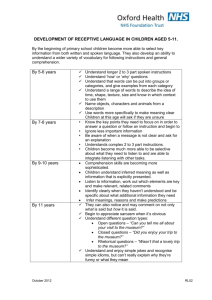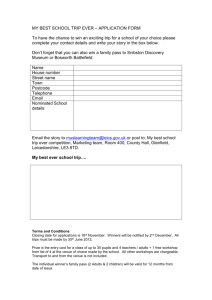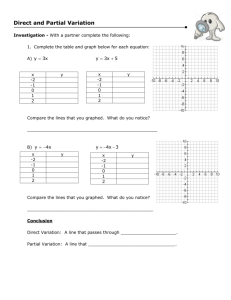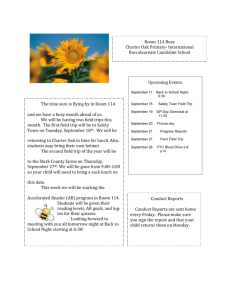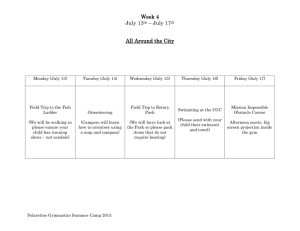How was your school trip?
advertisement
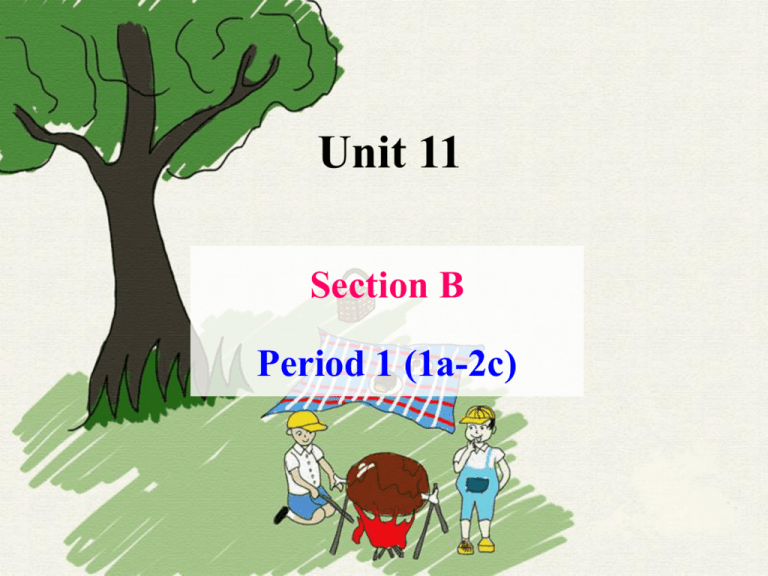
Unit 11 Section B Period 1 (1a-2c) Did you have a school trip? How was your school trip? What did you do on your school trip? went for a walk (go) milked a cow milk rode a horse ride fed chickens feed talked with a farmer talk took some photos take went to the zoo took photos saw some interesting animals climbed the mountains ate our lunch / have a picnic saw a lot of flowers played some games 3 a Complete Jim’s letter on the left and Bill’s reply on the right. Dear Bill, How _____ was (is) your school trip yesterday? _____ go (go) Did (Do) you ____ to the zoo? ______(Do) you take any Did photos? ______ Did (Do) you _____ see (see) any interesting animals? I _____ went (go) to the zoo last year and it ____ was (is) a lot of fun. Jim Dear Jim, My school trip _____ was (is) great! We _____ had (have) so much fun! We ______ went (go) to Green Park. We _________(climb) the mountains there and ______ climbed saw (see) a lot of flowers. We _____ ate (eat) our lunch under some trees and played _______ (play) some games after that. But at about two o’clock, it ____(get) very cloudy got and we _________ worried (worry) it would rain. Luckily, it did _______ _____ not (do not), and the sun came (come) out again! Bill 3 Make up a story. Each student adds a b sentence. Last week I visited my aunt’s house. The weather was beautiful. We went fishing. 一般过去时 一般过去时可以表示过去某一时间或某一段 时间发生的动作或存在的状态。 动词过去时的变化规则: 1. 一般情况下, 在动词原形末尾加-ed ; 2. 结尾是字母-e 的动词加-d; 3. 结尾是“辅音字母+y” 的动词,变y 为i 再加-ed; 4. 重读闭音节结尾,双写动词尾辅音字母 再加- ed。 The rules of the past form 1 played worked wanted 2 decided lived carry—carried 3 worry—worried 4 stop—stopped plan—planned needed improved study—studied shop—shopped 5 动词的不规则变化: go—went have—had eat—ate see—saw buy—bought take—took win—won hang—hung 写出下列动词的过去式。 1.see________ 2.take________ saw took hung 4.buy________ bought 3.hang________ slept got 5.sleep________ 6.get_______ 7.meet________ 8.sound________ met sounded 9.watch________ lived watched 10.live________ 一般过去时的用法 1. 在一般过去时中,be动词 am 和 is要 改为was, are改为 were。 2.动词be的疑问句,把 were或was放在主 语前面,句尾加问号; be的否定句,在was 或were 后面加 not; 肯定回答和否定回答时态要与问句中 的时态一致。 例句: You are at school every day. (一般现在时) You were at school yesterday. (一般过去时) Were you at school yesterday? Yes, I was. No, I wasn’t. 3. 实义动词变成疑问句时,要用助动词 did来帮助构成,这时谓语动词用动词 原形。 We had different kinds of seafood yesterday. 改为一般疑问句: Did you have different kinds of seafood yesterday? 选用动词的正确形式填空。 be visit sound win buy see take get live bought 1.I went to the museum and ________ some souvenirs. was 2.There ________ an old temple(庙)at the foot of the mountain before. visited my aunt’s house. 3.Last week I ________ saw some really clever kids when 4.We _____ we were in their school. be visit sound win buy see take get live sounds very interesting. 5.I think it ________ lived in California and worked as an 6.He ________ actor. took 7.After that, they ________ the bus back home. won the first prize? Toby did. 8.Who ________ got 9.Tina ________ Dean’s autograph and read it. 【2011四川德阳】– Do you know who cleaned the blackboard, Tina? -- Yes. John _____. A. do B. does C. did 答案: C 【解析】本题考查时态的运用。擦黑板 是已经过去发生的动作。在回答时,也 应用过去时态,应排除A、B,故选C。 【2012北京】— Where were you last Saturday? — I ____ in the Capital Museum. A. am B. will be C. was D. have been 【答案】C Your sweater looks smart. Where ______ you ______ it? A. do; get B. did; get C. will; get D. have; got 【答案】B Do you want to … on next school trip? visit a fire station climb a mountain go fishing Do you want to … on next school trip? go to the zoo ride a horse visit a museum 1a Match the activities with the pictures. 1. go to the zoo ____ a 4. climb a mountain ____ e c 5. visit a fire station ____ d 2. visit a museum ___ 3. ride a horse ____ b 6. go fishing ____ f What do you most want to do on your school trip? I went to … I think it is (sounds) good (great / OK / fun / funny). Is there anything you don’t want to do on your school trip? What are they? Why? I don’t want to … It is not good / terrible boring … Make up a story. Each student adds a sentence. Last week, I went to the zoo. I _____in the zoo. After that I _______. It was__________. Then I_____, I was________. 1 take some photos 3 see a lot of flowers 5 play some games 7 visit a fire station 9 visit a museum 11 go to the countryside 13 see some paintings 2 see some interesting animals 4 ride a horse 6 climb a mountain 8 go fishing 10 eat our lunch/ have a picnic 12 go to an art museum 14 draw pictures 1b Listen and answer the questions. 1. How was Jane’s trip? It was terrible. ___________________________________ 2. How was Tony’s trip? It was great. ___________________________________ 1c Listen again. What did Jane and Tony do on their last school trip? Check (√) Tony or Jane. went to the countryside climbed went to saw some drew a an art paintings pictures mountain museum Tony Jane √ √ √ √ √ 1d What was your last school trip like? Discuss it with your partner. I went to … That sounds … Do the following words describe 2a good things or bad things? Put a√ for good and an ×for bad. Leave a blank if they can mean both. ____ √ interesting ____ √ lovely ____ × difficult ____ × slow ____ √ exciting ____ √ lucky ____ √ cool × boring ____ ____ hot ____ √ large ____ × expensive ____ × terrible ____ √ delicious ____ √ great ____ cheap ____ fast 2b Read Helen’s and Jim’s diary entries and answer the questions. 1. Did Helen and Jim go on the same trip? Yes, Helen and Jim went on the same trip. 2. How do they feel about the trip? Helen thought the trip was great, but Jim didn’t like the trip at all. Read Helen’s and Jim’s diary entries again and find out the verbs in the past tense. went, visited, was, got, saw, learned, taught, took, bought, were Can you write out the verbs in the base form? 2c Complete the chart. How do Helen and Jim describe these things? Helen Jim the trip exciting terrible the train fast the really interesting museum the gift shop and lovely, not expensive gifts slow big, boring, dark, too many people so expensive 1. all in all 相当于汉语中的“总的说 来;总之;整体上说”,用来对所阐 述的内容进行概括性总结及归纳。例 如: All in all, I think you did a good job. 总的说来,我认为你干得很好。 2. be interested in 对……感兴趣 例如: We are interested in English. 我们对英语感兴趣。 辨析:interested / interesting interested / interesting 二者均为形 容词,interested 用于“be (become) interested in的结构中,表达的是某人 对某事或某物是感兴趣的; 而 interesting 则指某事或某物本身 具有使人感兴趣的特性,即某事(物) 本身是“有趣的;有意思的”,在句中 既可作定语,也可作表语。 I am interested in collecting stamps. 我对收集邮票很感兴趣。 That is an interesting book; you must read it. 那是一本很有意思的书,你一定要读 读。 用interesting / interested 填空。 1. The book is very interesting _________. Most of the teachers are _________in interested it. 2. The boy is much ___________ interested in drawing. 3. 三岁的时候,他开始对音乐产生了兴趣。 He ______ _________ _______music whenbecame he was 3 interested years old. in 3. not at all / not… at all 意思是“根本不; 完全不”。例如: I don’t like mutton at all. 我一点都不喜欢羊肉。 She’s not at all good at badminton. 她完全不擅长打羽毛球。 写 作 请你回忆一个美好的周末,把它写出来, 你是怎样度过的?上哪儿去了?和谁去 的?做了些什么?天气怎么样? 可参考下列词汇: go out with friends, sleep late, watch TV, help mom and dad, rain Life is colorful and we need time to enjoy it. But now we have to study hard and try to get happiness from the study. 翻译下列短语和句子。 1. 到达那儿 get there 2. 下棋 play chess 弹钢琴 play the piano 打篮球 play basketball 3. 对感兴趣 be interested in all in all 4. 总之 not …at all 5. 根本不 6. 今天的报纸 today’s newspaper 7. 太多学生 too many students too much water 太多水 8. 学英语对我来说很容易。 It is easy for me to learn English. 9. 上周李老师教我如何下棋。 Last week Mr. Li taught me how to play chess. 1. Oral work 2. Written work: Write a short passage about what your classmates did on their last school trip.


